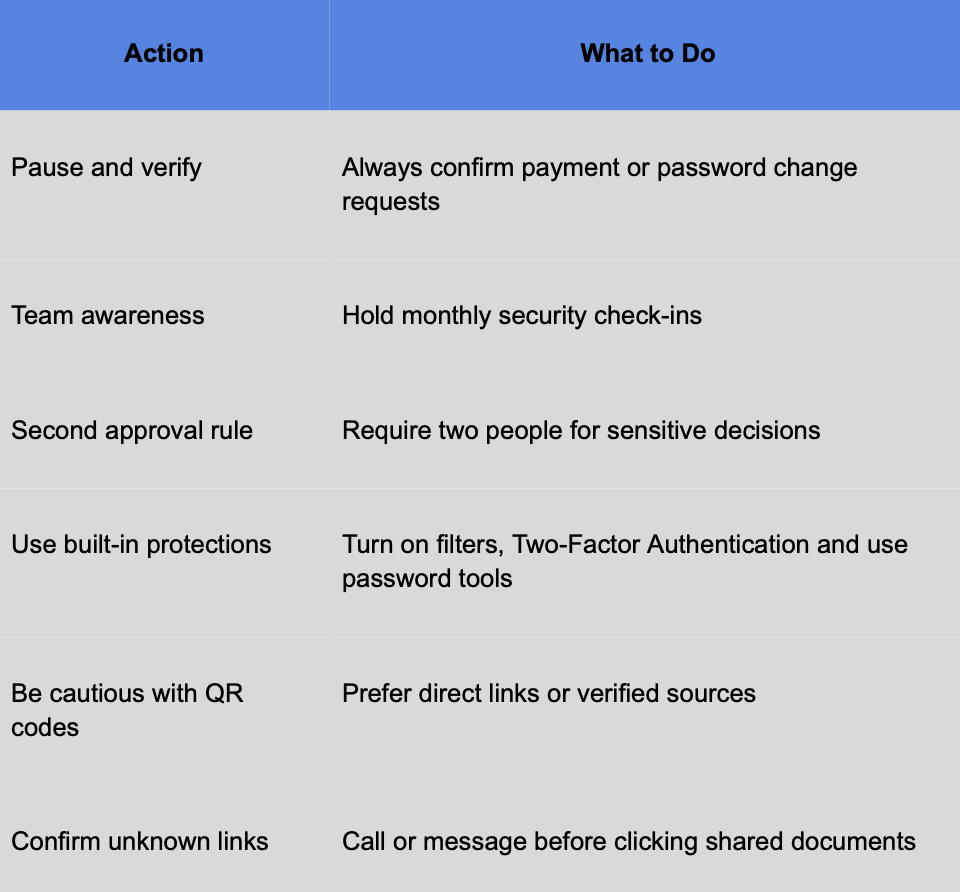How Small Businesses Can Stay Ahead of AI Scams
By Kelly Onu, Cybersecurity Consultant
If you think online scams are just about clicking the wrong link, think again. Today’s scams are powered by Artificial Intelligence (AI). Scammers can mimic your voice, clone your face, and forge your brand tone in seconds. Deepfakes, fake invoices, and impersonation attacks are now being created faster than ever, and small businesses are often the most vulnerable.
AI has helped small businesses grow faster, market smarter, and work leaner. But the same technology is also giving cybercriminals an upgrade. And if you are not prepared, your business could become an easy target.
AI Scams Are Smarter Than Ever
Scammers now use AI to create emails that sound natural and convincing. Many phishing messages are written by AI tools and are almost impossible to tell apart from real ones.
They also hide fake links inside trusted platforms like Dropbox, SharePoint, or Adobe Sign, making it harder to spot danger. Nearly all phishing attacks today use these kinds of legitimate services to sneak past filters.
New scams are also using QR codes to trick people into visiting fake websites. And with voice and video cloning tools, scammers can now impersonate your voice or image with just a few seconds of audio or video.
These tools are cheap, fast, and easy for attackers to use, which makes small businesses an easy target – especially when there’s no dedicated IT team.
Why Small Businesses Are Being Targeted
If you run a small business, especially a woman-owned or community-based one, you might assume you're too small to be targeted. The reality is the opposite.
Smaller companies often rely on personal relationships and trust, which scammers can exploit. Lean teams, tight budgets, and a fast pace mean there’s often no full-time IT support, no regular security training, and limited time to review security alerts.
Verizon’s 2024 Data Breach Investigations Report shows that 43% of all cyberattacks target small businesses. But fewer than 20% feel equipped to defend themselves.
The good news is that you do not need to be a tech expert or have a big budget to stay safe. With a few smart habits and regular practices, you can protect your business.
What You Can Do Now
1. Pause Before You Pay or Click
If someone sends you a payment request, login link, or asks for a password reset and you weren’t expecting it, stop and verify. Call the person directly using a number you trust. That quick check could save you thousands of pounds.
2. Hold a Monthly Check-In With Your Team
Set aside 10 minutes once a month for your team to discuss any strange emails or messages they received. This simple routine builds awareness and often stops scams before they succeed.
3. Use the Two-Person Rule
Create a simple policy. No payments, software installs, or password changes should be approved by only one person. Always require a second set of eyes on big decisions.
4. Turn On the Tools You Already Have
You do not need to buy fancy software to stay safe.
- Enable spam and phishing filters in Gmail or Outlook.
- Use two-factor authentication (2FA) for email, banking, and key business tools. This means you get a text message or app confirmation when logging in.
- Use password managers like Google Password Manager or 1Password to create and save strong, unique passwords.
5. Watch for QR Code Scams
If you receive a QR code in an email, ask yourself why it was sent. If possible, visit the website directly instead of scanning the code. QR scams are hard to detect and becoming more common.
6. Only Click What You Expect
If someone sends you a file or document link through Dropbox, SharePoint, or another third-party platform and you were not expecting it, do not click. Call or email the sender directly to confirm it is real.
Your Security Checklist
Final Thought: You’ve Got This
Scammers are hoping you are too busy or too trusting to notice their tricks. But with just a few simple steps and some consistency, you can protect yourself and your business. AI is making it easier than ever to grow and scale as a small business. But as technology changes, so must our awareness. By staying informed, alert, and connected with your team, you can outsmart the scammers and keep your business safe and thriving.



